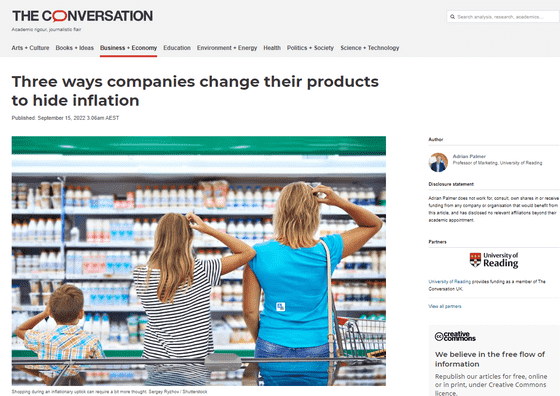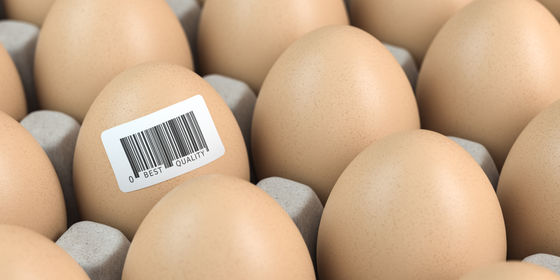Three tactics companies use to cheat price increases

by
There should be many people who have opened a bag of potato chips and felt that 'somehow less than before'. There are some products such as iPhones and semiconductors , where inflation directly leads to price increases, but in fields such as food where price competition is fierce, companies cannot raise prices without hesitation. Marketing experts have divided the methods companies use to hide the effects of inflation from consumers into three categories.
Three ways companies change their products to hide inflation
https://theconversation.com/three-ways-companies-change-their-products-to-hide-inflation-189924

According to Adrian Palmer, a professor of marketing at the Henry Business School at the University of Reading in the UK, consumer prices in the UK will reach 10.1% in July 2022, the first double-digit increase since the 1970s. It is said that inflation is progressing at a level close to the highest ever, such as recording the rate. In response to this, Professor Palmer attempted to compare the economic environment in recent years with that of the 1970s, but realized that a simple comparison was not possible due to the dramatic changes in people's consumption and saving behavior over the past half-century.
The major differences are the emergence of the Internet, the globalization of supply chains, and the deregulation and privatization of services that were once monopolized by the state. These changes have allowed people to purchase goods and services from multiple sources, exposing many businesses to increased competition.
Professor Palmer therefore summarizes the following three responses that companies should take in the face of increased competition and rising costs:
◆1: Value commercialization
According to Professor Palmer, when consumer disposable income decreases, retailers tend to increase sales of their own branded groceries. In response to recent inflation, British retailers and supermarkets have advertised low-priced products with 'basic' and 'essential' slogans, and the same phenomenon was seen in the 1970s.

For retailers, low-price products have low profit margins, creating a dilemma: the more low-priced products they sell, the lower the sales of high-margin products. On the other hand, supermarkets make full use of their own branded products to sell their own branded products at low prices, as they are more profitable than the manufacturer's branded foodstuffs, and low-priced products are perfect for appealing that they are affordable. It will push you forward.
For example, due to recent inflation in the UK, German discount supermarkets
◆2: Shrinkflation
Shrinkflation is a phenomenon in which the contents decrease while the price stays the same. In Japan, it is also called 'stealth price hike' and has been a hot topic in recent years, but as soon as the cost is reduced, it can be restored as soon as possible, so it is useful as a general strategy for British manufacturers who are worried about cost pressure. That's what I'm talking about. When the manufacturer reduces the contents, it does so quietly, but when it is restored, it makes a big appeal as a new product that is increasing.
One of the changes since the 1970s is the spread of barcodes. With product management methods that use labels, consumers become aware of the price each time the label is attached. It is reported that it is difficult to access information.

On the other hand, the spread of online shopping and Internet searches has made it easy to compare unit prices by weight and size, making it easier for consumers to spot shrinkflation again.
◆3: Self-service
A classic example of self-service is prefabricated furniture. Inflationary pressures surfaced in the form of consumers doing parts of the manufacturing process themselves, instead of companies selling finished furniture. On this point, Professor Palmer said, ``It's too simple that companies make things and consumers consume them. Many of the products we consume are the result of joint efforts between manufacturers and consumers.'' I am commenting.
This trend toward communalization is also evident in areas that have a greater impact on the economy than in the 1970s, such as banking. As a result of consumers becoming less dependent on people, many banks have reduced counters and shifted to online banking.

According to Professor Palmer, long-term changes in consumer behavior are often the result of multiple factors. The direction of inflation this time is also thought to depend on the effects of climate change and pandemics, and especially in the United Kingdom, the exit from the European Union, the so-called Brexit, is also closely related.
On the other hand, a culture that does not place importance on consumption has also taken root. Professor Palmer pointed out that it could lead to the mainstreaming of minimalist thinking that has been fringe until now.
Related Posts:
in Note, Posted by log1l_ks







